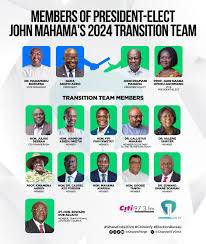"Controversy Over Last-Minute Recruitments and Payments in Mahama's Transition Period"
The topic of last-minute recruitments and payments allegedly intercepted by the Mahama Transition Team is a contentious one, rooted in Ghana's political landscape. It reflects concerns about the management of state resources and the use of public institutions during political transitions, a recurring theme in many democratic systems.
In Ghana, government transitions are often accompanied by accusations of financial mismanagement and administrative irregularities. The 2016 transition, following the defeat of John Dramani Mahama and the National Democratic Congress (NDC) by Nana Addo Dankwa Akufo-Addo and the New Patriotic Party (NPP), was no exception. Reports surfaced alleging that the outgoing Mahama administration had engaged in questionable recruitments and payments shortly before leaving office.
Allegations of Recruitment and Payments
The crux of these allegations lies in claims that the outgoing Mahama administration had authorized the recruitment of personnel into public service positions and made last-minute financial commitments. These actions, critics argue, were designed to tie the hands of the incoming government, creating financial obligations that would constrain the Akufo-Addo administration.
Such practices, if true, raise questions about the ethics of governance during transitions. Governments are expected to act in the nation’s best interest, ensuring a smooth transfer of power without saddling successors with avoidable burdens. However, last-minute recruitments and financial commitments are often seen as efforts to reward party loyalists and secure advantages for outgoing officials.
Transition Team’s Role
The Mahama Transition Team, established to facilitate a smooth handover, reportedly intercepted some of these processes. Transition teams are crucial in bridging outgoing and incoming administrations, ensuring continuity and safeguarding national interests. The interception of payments and recruitments suggests the team sought to prevent potential irregularities from taking effect.
Proponents of the Mahama administration argue that the recruitments and payments were routine governmental activities that had been planned and budgeted for before the elections. They contend that halting these processes could disrupt essential public services. However, detractors argue that these actions were hurriedly implemented with political motivations, undermining the integrity of the transition process.
Broader Implications
The controversy highlights the need for greater transparency and accountability in political transitions. Transition periods often expose the vulnerabilities of governance structures, where outgoing administrations might prioritize partisan interests over national stability. To address such challenges, reforms are needed to regulate activities during transitions, ensuring that governments operate within a framework that promotes fairness and continuity.
Ghana’s experience serves as a lesson for democratic systems worldwide. Political transitions must not become arenas for political score-settling but should instead reflect a commitment to democratic principles and the welfare of citizens. Ensuring transparency, instituting safeguards, and fostering dialogue between political parties can help mitigate the challenges associated with transitions.




No comments yet
Be the first to share your thoughts!